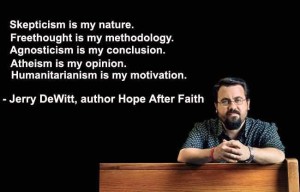 Recently a friend of mine had an exchange on the internet with an atheist during which he asked what compelling evidence for an omnipotent (supernatural) deity might change the atheist’s mind. My friend received this answer in reply:
Recently a friend of mine had an exchange on the internet with an atheist during which he asked what compelling evidence for an omnipotent (supernatural) deity might change the atheist’s mind. My friend received this answer in reply:
If all the stars were rearranged in the sky to spell “this is God communicating with you” and that everyone around the world could see it in their own language at the same time, then that would really make me change my mind.
It’s a good thing, knowing the standard for evidence of God has been set so low! (For the tone deaf, that was practically dripping with sarcasm.)
I wondered to myself: does this person apply the same level of skepticism to climate change, or the theory of evolution? Was this person even being serious? After all, sciency types and the evangelists of scientism like to huff and puff about insufficient evidence for belief in a supernatural God, but they typically become quite vague or absurd when asked what it would specifically take to pass their personal threshold of disbelief.
Then I remembered the wisdom of G.K. Chesterton, who said, “When men choose not to believe in God, they do not thereafter believe in nothing, they then become capable of believing in anything.”
At some point it occurred to me that this particular atheist might be thinking of author Douglas Adams as some sort of god. The evidence requested can be found on the pages of Adams’s classic novel The Hitchhiker’s Guide to the Galaxy. However, in that hilarious book, God’s message was not conveyed to humanity by reorganizing stars to spell words, but with letters as tall as a mountain spelled out a message to mankind. The message simply said, “We apologize for the inconvenience,” which helped Marvin the paranoid android feel a little bit better about his life experience as a robot, just as his battery died. Discovering a message of apparent supernatural origin like that, whether it was written on Uranus spelled out using stars in the sky, would certainly qualify as very compelling evidence that an entity with supernaturally superior intellect must exist.
Somewhat predictably, the atheist talking with my friend equivocated and then qualified the hypothetical scenario that had just been presented, adding that a super-intelligent alien species couldn’t be completely ruled out as the creators of this hypothetical cosmic message as a deliberate illusion to fool humans into believing God had communicated with humanity (presumably for the entertainment value. Super-intelligent extra-terrestrials must get bored very easily.) I don’t have to literally see wind to believe it exists. Witnessing the effects of wind has been sufficient evidence for me to believe in wind.
It would save everyone a lot of time if atheists would have the intellectual honesty to admit their minds are closed to evidence and they simply don’t want to believe in God, and nothing would change their mind. The exchange of words reminded me of what Psalms 14:1 says…
The fool has said in his heart that there is no God.
Another factoid currently stuck in my mind is that Deuteronomy 6:16 and Luke 4:12 both basically say the same thing, do not put God to the test.
Words of wisdom.
Personally, I would never have the audacity to demand evidence from God above and beyond what we already have been given, which I described and discussed in some detail in my book Counterargument for God. But I have asked God to reveal Himself to me, and that’s why I am a theist. He did.
Which brings me to Jerry DeWitt.
Now in the spirit of full disclosure, I must confess that it is possible, that jealousy might be coloring my opinion of Mr. DeWitt to some degree.
Keep in mind, I’ve had six books published, but none of them made The New York Times bestseller list. USA Today and CNN haven’t produced sympathetic puff pieces about me.
Jerry’s only written one book, an autobiography. And he needed a ghost writer, just to help tell his story.
Okay, that sounded a bit snarky even to me, but I have to admit I’ve been wondering about this: what exactly makes the life story of a man with a high school education and no major personal accomplishments interesting enough to merit publishing his autobiography — other than the fact that he converted from being an uneducated Bible-thumping preacher to an under-educated atheist? In my opinion, it’s highly doubtful that a book about an atheist with a high school education who became a Pentecostal minister would have drawn the attention of a major publishing house. Just sayin’.
Comparatively speaking, after eight or more years of writing almost continuously, I’ve only managed the six books, and one brief cameo appearance in the national spotlight in the form of a brief interview on The Dennis Miller Radio Show.
Even then I wasn’t there to promote one of my books, but to discuss several articles I’d written about possible terrorist activity, published by the website American Thinker.
Lately good fortune seems to have smiled on Mr. DeWitt. I’ve tried to give him the benefit of the doubt.
Only a few short years ago, virtually no one had ever heard of Jerry. He was a small town preacher in rural Louisiana, struggling to make ends meet — about as successful as I’ve been with my books and novels. Ordinarily, people who believe they have been called to the ministry aren’t in it for the money. But Jerry decided that he was tired of being poor and unknown. He reached out to Dan Barker of the Freedom From Religion Foundation and soon found himself thrust into the limelight, a poster boy for The Clergy Project.
Now Jerry’s being treated like a rock star by atheists and freethinkers all across America. His autobiography is called Hope After Faith, described on his website as “A former Louisiana pastor’s courageous memoir chronicling his conversion to atheism.”
 Not too sure how much courage we’re talking about here…from start to finish, Jerry describes one situation after another that either leaves him blubbering tears or quivering in fear — the words “profile in courage” never entered my mind when I read his book. Jerry couldn’t even get onto an airplane unless he felt God tell him through prayer that it was okay to fly. We’re talking about a guy who comes across in his autobiography as afraid of his own shadow.
Not too sure how much courage we’re talking about here…from start to finish, Jerry describes one situation after another that either leaves him blubbering tears or quivering in fear — the words “profile in courage” never entered my mind when I read his book. Jerry couldn’t even get onto an airplane unless he felt God tell him through prayer that it was okay to fly. We’re talking about a guy who comes across in his autobiography as afraid of his own shadow.
Nevertheless, I have to give some credit where it is due — parts of his book were not only interesting, they were fascinating. Even unbelievable.
Let me give you an example that illustrates what I mean: at one point in his book, Jerry described a situation where he received a call with dreadful news — an associate’s wife had been diagnosed with a brain aneurysm (or maybe it was a tumor. I no longer have a copy of the book handy. It was a very serious, life-threatening situation.) Jerry decided to put his faith in God to the test. Without asking for directions from his location in Louisiana to Mobile, Alabama, or which hospital in Mobile, or even her room number, Jerry claims that he simply got in his car and asked God to lead him, then started driving.
Though it’s very difficult to believe, Jerry claims that he found himself in the right room in the right hospital, without ever taking one false turn. He added that he simply said a short prayer asking for the woman’s healing and recovery in the name of Jesus and just left the hospital, trusting that God would hear and answer his prayer. Then Jerry claims the absolutely impossible happened — the woman was healed. No surgery was required. The problem simply vanished, disappeared into thin air.
Question: how does a man making those amazing claims then become an atheist?
The answer is because God hasn’t answered every one of Jerry’s subsequent prayers the way he wanted, he began to pout, like a petulant child. After a close friend of Jerry’s was killed in a terrible car accident, he lost his faith because God’s answer to Jerry’s prayer was no. Oh, and he started listening to Richard Dawkins.
That will ruin just about anybody.
We’re all going to die, sooner or later. It’s simply a matter of time. What I’m not understanding is how Jerry can believe his own story and still become an atheist.
Apparently Jerry wants to be popular, and perceived as smart. Naturally he wants to sell books, and to earn as much income as possible. I can’t really fault him for wanting that.
Nobody wants to be disliked. Just about everybody wants more money than they currently have. Still, I have a message for Jerry: neither money nor fame are really important. Not in the Big Scheme of Things. Never forget this old cliche: you can’t take it with you.
Cliches become cliche for only one reason: they are obviously true statements.

Speak Your Mind